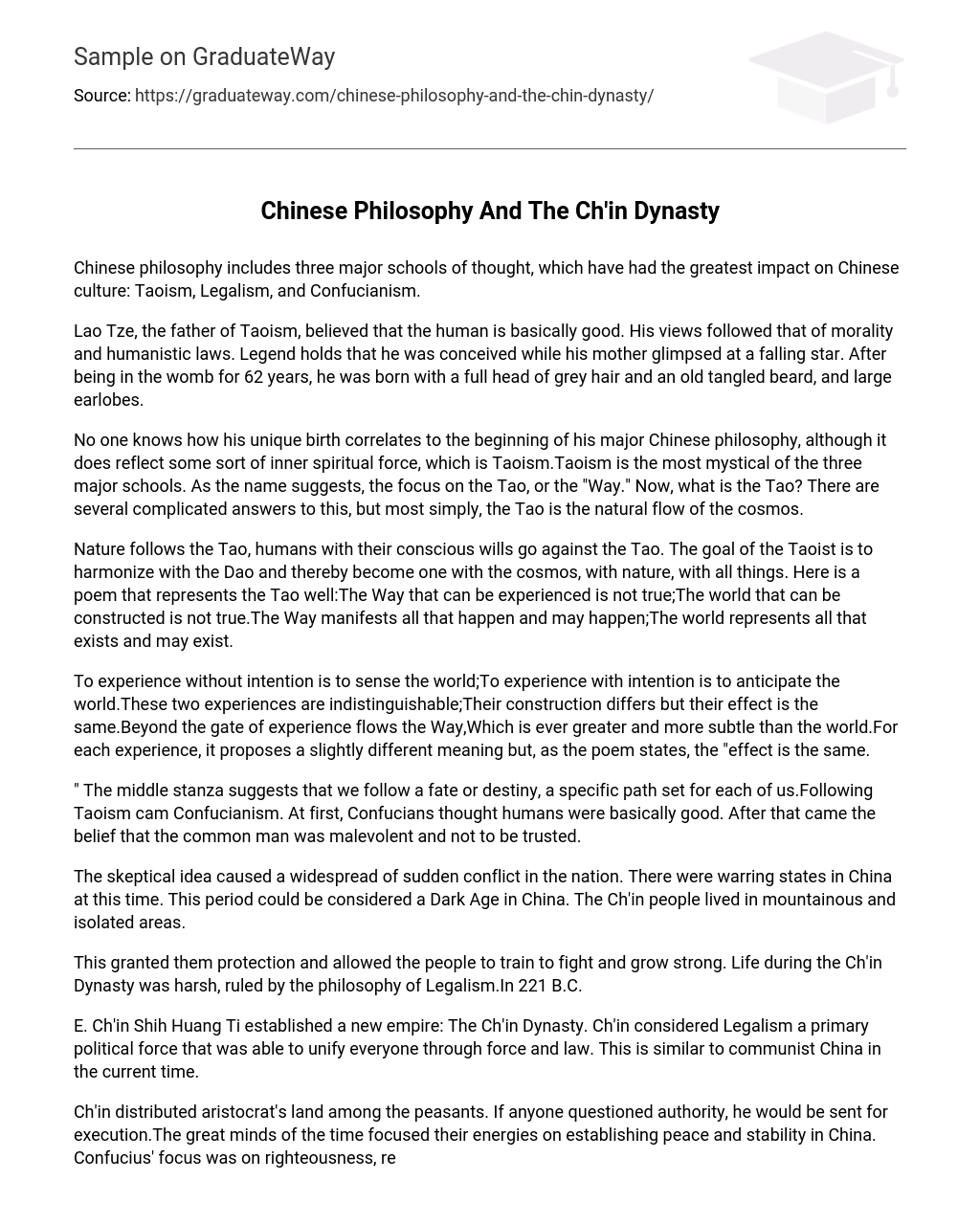Chinese philosophy includes three major schools of thought, which have had the greatest impact on Chinese culture: Taoism, Legalism, and Confucianism.
Lao Tze, the father of Taoism, believed that the human is basically good. His views followed that of morality and humanistic laws. Legend holds that he was conceived while his mother glimpsed at a falling star. After being in the womb for 62 years, he was born with a full head of grey hair and an old tangled beard, and large earlobes.
No one knows how his unique birth correlates to the beginning of his major Chinese philosophy, although it does reflect some sort of inner spiritual force, which is Taoism.Taoism is the most mystical of the three major schools. As the name suggests, the focus on the Tao, or the “Way.” Now, what is the Tao? There are several complicated answers to this, but most simply, the Tao is the natural flow of the cosmos.
Nature follows the Tao, humans with their conscious wills go against the Tao. The goal of the Taoist is to harmonize with the Dao and thereby become one with the cosmos, with nature, with all things. Here is a poem that represents the Tao well:The Way that can be experienced is not true;The world that can be constructed is not true.The Way manifests all that happen and may happen;The world represents all that exists and may exist.
To experience without intention is to sense the world;To experience with intention is to anticipate the world.These two experiences are indistinguishable;Their construction differs but their effect is the same.Beyond the gate of experience flows the Way,Which is ever greater and more subtle than the world.For each experience, it proposes a slightly different meaning but, as the poem states, the “effect is the same.
” The middle stanza suggests that we follow a fate or destiny, a specific path set for each of us.Following Taoism cam Confucianism. At first, Confucians thought humans were basically good. After that came the belief that the common man was malevolent and not to be trusted.
The skeptical idea caused a widespread of sudden conflict in the nation. There were warring states in China at this time. This period could be considered a Dark Age in China. The Ch’in people lived in mountainous and isolated areas.
This granted them protection and allowed the people to train to fight and grow strong. Life during the Ch’in Dynasty was harsh, ruled by the philosophy of Legalism.In 221 B.C.
E. Ch’in Shih Huang Ti established a new empire: The Ch’in Dynasty. Ch’in considered Legalism a primary political force that was able to unify everyone through force and law. This is similar to communist China in the current time.
Ch’in distributed aristocrat’s land among the peasants. If anyone questioned authority, he would be sent for execution.The great minds of the time focused their energies on establishing peace and stability in China. Confucius’ focus was on righteousness, relationships, benevolence towards others and keeping order in relationships and in the state.
He created “The Analects,” a collection of Confucian sayings recorded and bound together by his disciples. The Analects are interesting in that we are given a direct window into the thoughts of Confucius himself. The Analects are quotes and anecdotes, worked into a coherent, organized whole.Each philosophy were great influences on Chinese culture today.
Taosim encouraged naturalness of the world, which truly expressed sincerity and peace through the people. During Legalism, the Ch’in standardized the currency, measurements of length and weight, and unified the Chinese language, which differ among dialects, by regulating characters to correspond to objects and words. Also, I believe Legalism brought a new discipline in the Chinese people. Lastly, Confucius influenced righteousness and morality among Chinese people.
The direct and unique approached amongst the three philosophies established a very capable and civil society.





